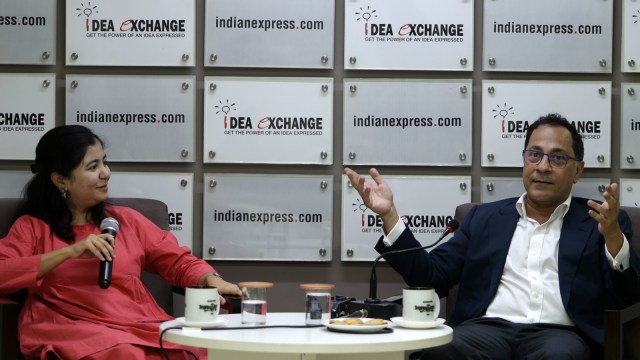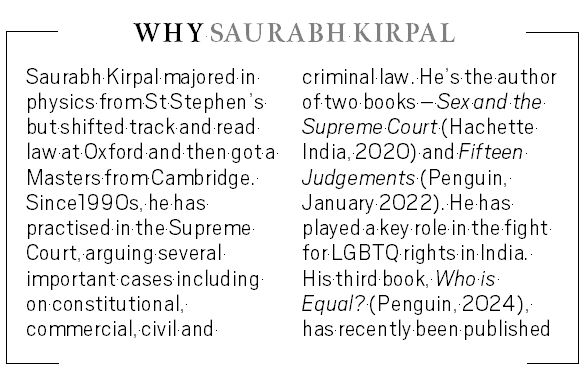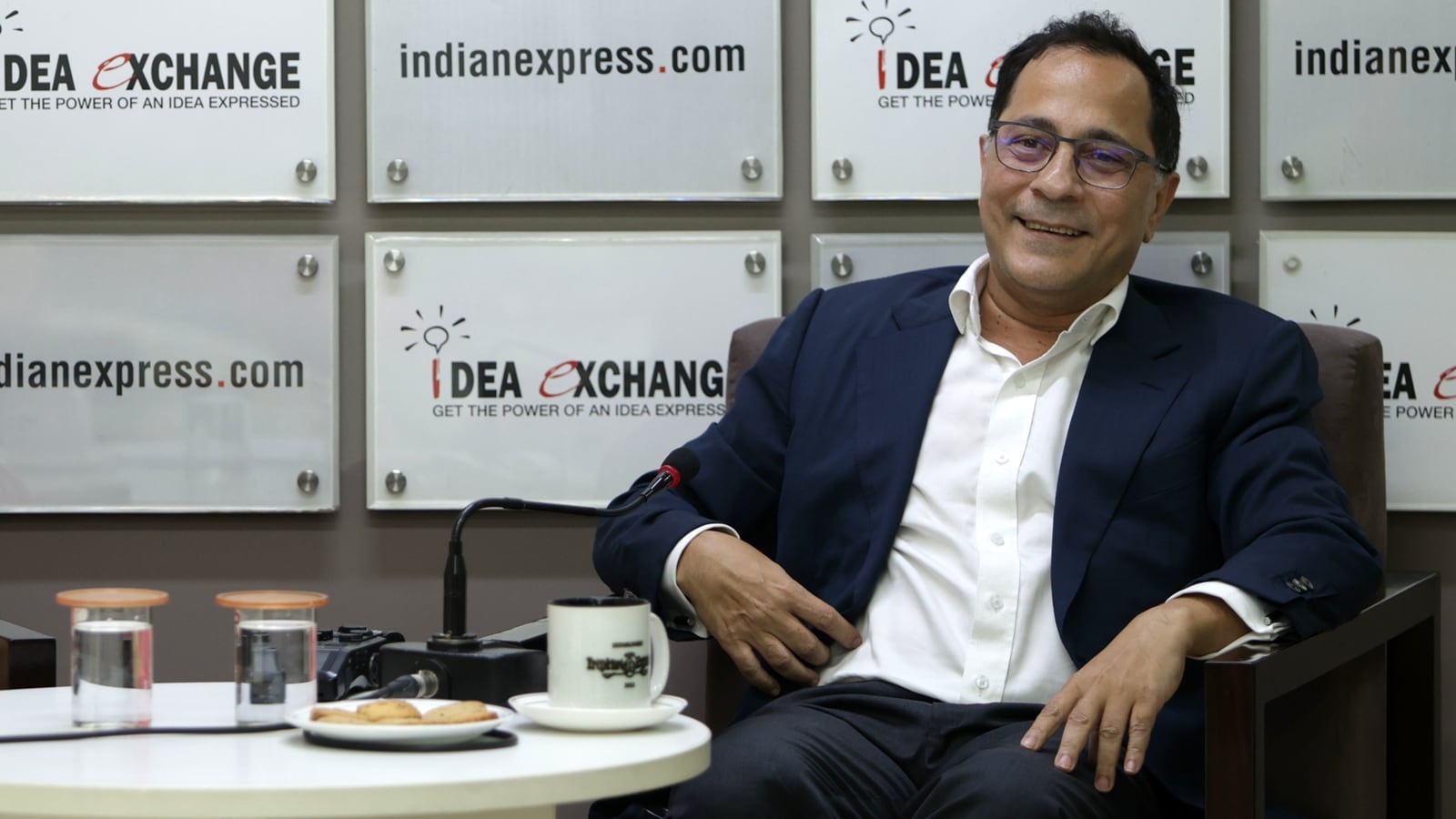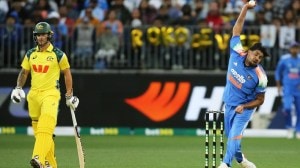Saurabh Kirpal: ‘The biggest challenge for our court is religious minorities… The problem is here and now… it’s getting worse’
Saurabh Kirpal majored in physics from St Stephen’s but shifted track and read law at Oxford and then got a Masters from Cambridge. Since1990s, he has practised in the Supreme Court, arguing several important cases including on constitutional, commercial, civil and criminal law.
 Supreme Court lawyer Saurabh Kirpal (right) with Apurva Vishwanath, National Legal Editor, The Indian Express, at the Noida office. (Express photo by Gajendra Yadav)
Supreme Court lawyer Saurabh Kirpal (right) with Apurva Vishwanath, National Legal Editor, The Indian Express, at the Noida office. (Express photo by Gajendra Yadav)Supreme Court lawyer Saurabh Kirpal on why he would accept judgeship, on India not being a rights-based society, and the institutional vulnerabilities of the judiciary. The session was moderated by Apurva Vishwanath, National Legal Editor, The Indian Express
Apurva Vishwanath: Your latest book Who is Equal? records this shift in our courts from what we call a formal reading of the law to what we understand is substantive equality? A Dalit judge, BR Gavai, who is next in line to be the Chief Justice, spoke about the creamy layer in Schedule Caste (SC) and Schedule Tribe (ST) quota and there is another judge who agrees with him. So, how does the Supreme Court frame this question?
The question is about the fundamental way adjudication happens in court. Are judges able to extricate themselves from their own ideologies? The short answer is no. While legal training allows judges to be neutral in their thinking and focus on the law and the Constitution, there is a fair degree of leeway of interpretation. In the process, the personal lived experiences of all judges become absolutely relevant… In the last five to 10 years, it has reflected, say, in the political ideology of Justice Krishna Iyer in the ’70s or Justice K Subba Rao and his right-wing ideology. This belief in what the Constitution should be ends up being somehow reversed engineered into what the Constitution is… There’s a big brouhaha about this creamy layer. But this concept had been accepted for the SCs by the Supreme Court 20 years ago in Jarnail Singh’s case… The judges have maybe reiterated it and seem to push for it almost as if it is a good thing. That, I suppose, is new… I have a problem with the idea of a creamy layer for SCs. It has no place in our constitutional jurisprudence because it fundamentally undermines the idea of what historical discrimination is.
 Supreme Court lawyer Saurabh Kirpal
Supreme Court lawyer Saurabh Kirpal
Apurva Vishwanath: In the last few years, there’s been a greater emphasis on the other facets of equality — on gender, sexual minorities and disability rights. Apart from caste, how has the court fared on these things?
There have been some ups and some downs, some highs in the lows… On women, it has steadily improved over the years… In terms of caste, there is a continuous flip-flop because it’s contentious… But, I think the biggest challenge for our court today is religious minorities… The problem is here and now and it’s just getting worse. Here again, the court has probably lessened its protection in the last 75 years… It’s not as if they don’t intervene when it’s required. The delay in their intervention in matters often allows the problem to go unchecked and therefore the religious minorities don’t get the protection that they need now.

Apurva Vishwanath: A Collegium resolution from last year says that there are two reasons why the government had objections to your candidature. What are your thoughts? Would you still accept judgeship?
Of course I’d accept it. I was 45 when I was offered it. Had I become a judge at that point, I would have been one of the senior-most judges in the country… That did not happen. I accepted judgeship as a cause and not as a personal gain… The requirement of there being a more robust judiciary with people who are more fiercely independent has only increased in seven years. The idea that I have to fight as a role model for the queer community or indeed any other disadvantaged community has only become stronger. This is not about me at all.
On the anti-conversion laws: It is not for the state to question why people are converting (to another religion)… What is the problem you are trying to solve by enacting these anti-conversion laws other than a dog whistle?
Story continues below this ad
Apurva Vishwanath: A reference that the Law Ministry makes is that you espouse the cause of the gay community and that it could become a bias when you become a judge.
If you just unpack that, what does that mean? One person’s bias is another person’s adherence to the Constitution. We see multiple female judges saying that women are treated badly in our country. Justice BV Nagarathna has passed many judgments where she talks about how a judge can improve the place of women in society. That’s not bias, that’s reality. That’s the job of a judge, to ensure that you reach out to injustice in every home, every person, wherever you find it and remedy it… There is a genuine need to reflect diversity. It could be the Law Ministry’s bias, but diversity in itself is valuable.

Rakesh Sinha: Do you think your sexual orientation and not so much your partner’s nationality was the real reason why the government objected to your point?
I don’t have any doubt about that. My partner and I have been together for 25 years. He’s lived in India for 20 years. We would have been married if this country allowed us. Why is it that in all these years, and since decriminalisation in 2018, has no other queer person been appointed as a judge? I’m not the only queer lawyer. There are people who are far more able than me. Even if they’re not, as I said, I advocate for diversity… When someone says there’s no discrimination against Dalits, I ask them how many Dalit cabinet secretaries have there been? When someone says there’s no discrimination against women, ask how many female Chief Justices of India there have been… It won’t change if I didn’t have a partner or if my partner was an Indian national. Will the other ministers in the government resign, if their partners are not Indian, which some of them are… If it’s okay to have a foreign spouse when you have the opposite gender, then what happens in the case of a queer person? It’s obvious.
On Religious Minorities: The court has lessened its protection in the last 75 years… The delay in their intervention often allows the problem to go unchecked and so religious minorities don’t get the protection they need
Story continues below this ad
Rakesh Sinha: You had plans for a Queer Bar Association…
Yes, we did and we still do. Just trying to get the critical mass of people together is proving somewhat of a challenge. There are concerns about what words we can use. Also, the Queer Bar Association is not going to be a monolith… You have to make sure that there is a coherent whole.
 Supreme Court lawyer Saurabh Kirpal
Supreme Court lawyer Saurabh Kirpal
Apurva Vishwanath: Be it the bulldozer phenomena or the shop signages for the Kanwar Yatra — the court picks up these cases really late. Where does it leave us?
One of the problems with undoing injustices in terms of religious minorities is not the fact that the courts aren’t doing something about them, it’s that they’re doing them too late. The fundamental problem there is, is that everything comes to the Supreme Court. But the first point of contact that citizens have is not the Supreme Court of India. It’s the trial courts, with the high courts… And the trial courts are not giving bail to people who need to get bail quickly enough. The high courts are not intervening quickly enough to stop bulldozers from demolition when they need to… Why are lawyers not standing up and saying that there are injustices and we will have a group of pro-bono lawyers who will try to fight every time a Muslim home is demolished unauthorisedly by a bulldozer? You don’t have that.
On the Basic Structure: It’s a kind of self-preservation doctrine for the courts, because if they don’t have the Basic Structure, a government in the future can blow them out of the water, as it almost did until the Kesavananda Bharati case
Story continues below this ad
Sukhmani Malik: In the recent elections, queer rights or trans rights didn’t figure in any kind of significant manner. Where do you think are the fissures?
I think one important thing that needs to happen is that queer rights need to become a political issue. We’ve seen how fast the country has changed from 2018 till 2024… We’ve seen this across the world. The marriage equality case in the US was in 2015. It was a shocker for its time. Then, last year, after the judgment in the abortion case, the right to marry has now been enshrined in the federal law. That’s because of a political pressure that has been felt… It’s because the queer community is coming to the mainstream, they have more allies, not only in other subaltern groups, but also among friends and family. You can hate a gay man, but it’s kind of difficult to hate your cousin or your uncle or brother… I think that change will start happening politically… The Congress manifesto did say that they would have an anti-discrimination law, a right to civil union… Even the BJP had a small section about ‘Garima Greh’ for the transgender community in their manifesto.
 Supreme Court lawyer Saurabh Kirpal
Supreme Court lawyer Saurabh Kirpal
Deeptiman Tiwary: We see both in lower courts and the Supreme Court, a kind of socio-political pressure and its effect on judgments and observations.
We have seen in the recent past the courts taking a stand on certain legal issues, contentious cases, people getting bail which was denied earlier. For instance, the case of Arvind Kejriwal and Hemant Soren. Soren got bail and Kejriwal got bail and then it has been stayed and it is still being heard… As for the political environment shaping the outcome of cases, it’s easy to be fearless when you have nothing to fear. A strong executive does cast that extra pressure on the judiciary, maybe not directly because the Chief Justice has gone on record and said he has never been approached for a political case and there is no reason for me to disbelieve him.
Deeptiman Tiwary: Then why doesn’t Umar Khalid get bail?
Well, that’s one of the greatest travesties of our legal system that Umar Khalid has not yet got bail. It was a tactical move on the part of the lawyers to withdraw the bail application in the Supreme Court. They, perhaps, had seen the writing on the wall… it is a slur on our society that a person has been incarcerated for so long without trial. I offer no excuse… It is something we just have to hang our heads in shame for.
Apurva Vishwanath: We talk so much about independence of judiciary, but where are the institutional vulnerabilities?
Well, I think one vulnerability is the difference in retirement age between the high court and the Supreme Court. So a Supreme Court judge retires at 65, a high court judge retires at 62. So every high court judge wants to go to the Supreme Court and would therefore be more amenable to being leaned on by some force or the other so that they get an extra three years of tenure, right?… Other institutional vulnerabilities are the lack of transparency… Then, where the executive is also concerned, is the absence of accountability in compliance to Collegium resolutions.
 Supreme Court lawyer Saurabh Kirpal
Supreme Court lawyer Saurabh Kirpal
Apurva Vishwanath: With regard to Delhi Article 239AA, the Supreme Court keeps saying that it is an elected government which has to make these decisions. The Centre brings in another law, another ordinance, which goes back on it. In such cases, what does the court do?
It is far more complex, because it’s not just the courts to blame. Some of this impasse has been created by Parliament and some of it by the executive. A law has come. Until it is struck down, there is obviously the fact that that law will have to be complied with… Just because you don’t like it doesn’t mean the law should change in a situation where you think the law should change. It has to be done across the board.
Adya Goyal: You mentioned that we are not a right-focused society. What has led to that?
I think that the fact is we have a very hierarchical society. In the large social structure, it’s caste. Within the family, it’s the father who’s the head of the family. These rigid structures of hierarchy allow the belief that your rights are not given to you automatically by birth but are given by some higher authority. We see the Constitution, too, as something that is given to us rather than it merely recognising the rights that we have. Secondly, we don’t have a history. Ours is not a country that was born in a revolution with rights being at the fore… A revolution was promised in the Constitution but the very people who promised the revolution were the first to undo it. So the first amendment to the Constitution was carried out by Dr Ambedkar and Nehru. These giants who propounded freedom sought to undo it the moment it started affecting them… One lovely phrase, I forget who said it, is that the Indian Constitution is one of those few ones which needs protection from itself.
Raj Kamal Jha: Where do you see the NJAC (National Judicial Appointments Commission) going? Also, linked to this is the Basic Structure doctrine. When push comes to shove, the government steps back. Do you think these two are lines in the sand or lines etched in stone?
Well, nothing is etched in stone because both these concepts are also created, right? I think both these things are relatively safe for the time being… But, one may be undone by Parliament and the other by the courts… On the NJAC, given the fractious nature and the constitution and composition of the Parliament, I don’t think the numbers exist for this change to happen… Because whatever one group says will be met with distrust by the other… The second is what the courts themselves can do in terms of the Basic Structure. That is as a concept so ensconced in the idea of law, it’s unlikely to be changed… It’s also a kind of self-preservation doctrine for the courts, because if they don’t have the Basic Structure, some government in the future will blow them out of the water, as was about to happen till the Kesavananda Bharati case came… My worry is more not in the wholesale abandonment of the doctrine, but in its application and the courts not standing up when they need to.
Shiny Varghese: Who takes responsibility when it comes to environmental cases? Is it the judiciary or is it the executive?
It’s up to Parliament to make laws, the executive to implement it, and the courts to step in and say you’ve exceeded it or you have not performed under that particular statute or Act… But then there’s a fundamental tension… about the court taking a proactive role and then making certain rulings, or on the other hand not doing anything when there’s a violation of a fundamental right. It’s a tough one, but it has to be grappled with not just in courts, but by citizens every day about how they think of their courts… You saw what happened in Israel when the court’s autonomy was attacked. You had people marching out onto the streets. The Constitution doesn’t belong just to the 34 judges or the lawyers. It belongs to every Indian citizen. And it’s time we own up to it.
Asad Rehman: With the new anti-conversion laws and the Special Marriage Act, how do you think we can move forward and make it easier for people from different communities to get married?
With regard to the Special Marriage Act, I hope the courts strike down the 30-day requirement… It infringes upon the autonomy of people and causes possible censure, and, therefore, is unconstitutional. As regards the anti-conversion law, certain laws have been upheld by the Supreme Court in the past, which need reconsideration… People convert for all kinds of reasons. Mostly it’s statism. I call myself Hindu because I was born a Hindu… A large number of people are of the religion they have because they were born that way. If someone makes an effort to change, there must be some reason that they have which is deep and meaningful and personal. And it is not for the state to question why they are going against that reason to convert… What is the problem you’re trying to solve by enacting these anti-conversion laws other than a dog whistle? So, I think the court should revisit its judgment.
Apurva Vishwanath : What’s the next course on the same-sex marriage case?
Society is changing for the better, surely the courts will keep up. Even these five judges recognise the right to a relationship… And younger judges will come, judges with more empathy… I think the young will bring it. I have no doubt. Five years is what it took from Navtej to a right to relationship in Supriyo. I dare say within the next five years we will have something far more than what we have now.





- 01
- 02
- 03
- 04
- 05


























